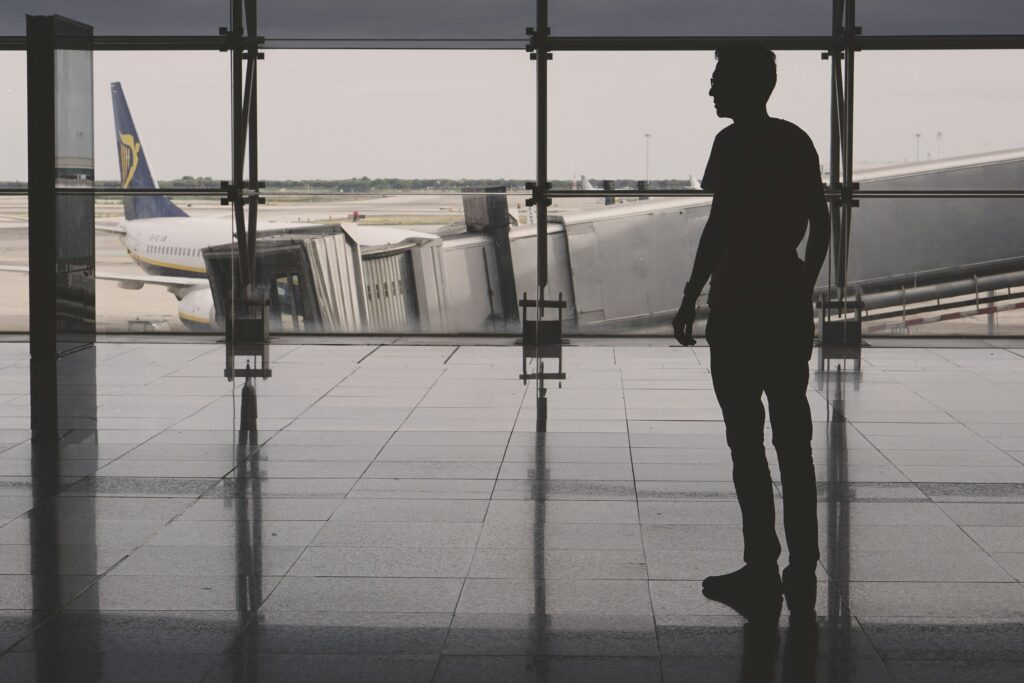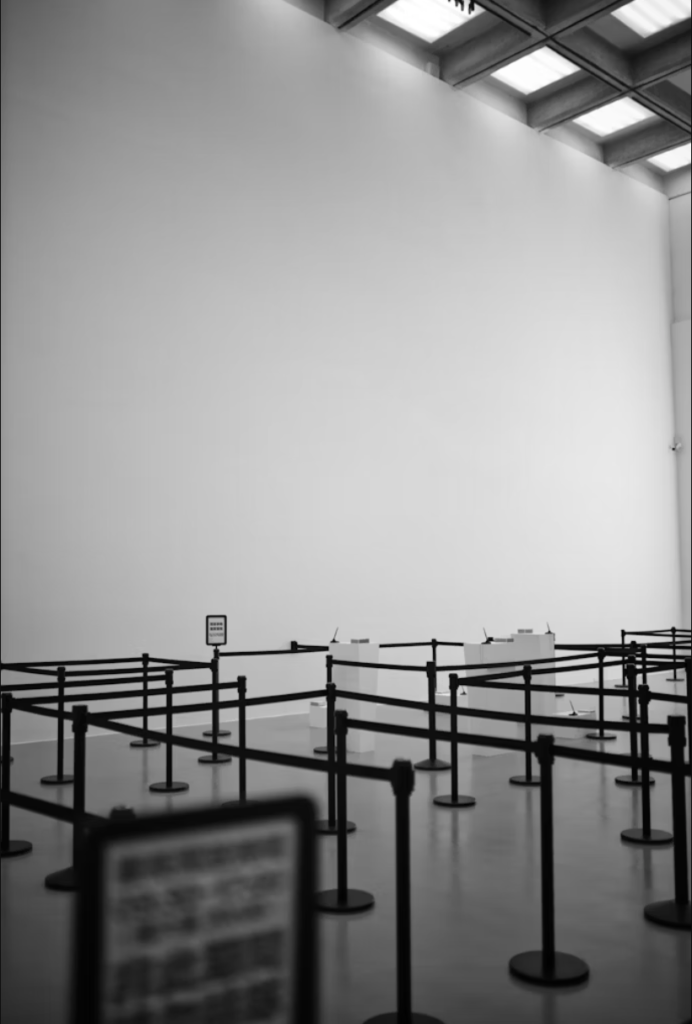
From an Island to a Desert: A Journey Through a Global System That Inspects the Poor and Permits Privilege
Article by Kahlan Alradhi
Header Image “silhouette of man on airport lounge” by Anton Porscheis is free to use under Unsplashed License.
Three days of continuous travel, from the calm island of Taiwan to the wounded heart of Yemen. The journey was not merely a geographic passage between stations, but a spiritual and physical experience one that carved into memory, raising questions about humanity, authority, alienation, and the dignity of passage.
The journey began at Taipei Airport, where one is not judged by basic human qualities or fairness, but by their passport. A Yemeni passport is not merely a document of identity; it is a constraint that narrows your options and imposes visa requirements to pass through airports that others breeze through like clouds. Even a “transit” in Hong Kong – technically not an entry – required a visa. Crossing becomes a privilege, and travel itself a political luxury.
From Taiwan to Oman, and then to Yemen, each stop carried a distinct meaning, each a chapter in the modern world, where rights are granted not on the basis of human dignity, but of documentation. The journey might have been shorter, had Israel not bombed and effectively closed Sana’a Airport –turning access to the capital into a geopolitical obstacle. My homeland – Yemen – has become unlandable. Thus, I had to fly from Taipei to Bangkok, Bangkok to Muscat, and Muscat to Salalah. After all these flights were a long journey by land from Salalah to Sayun, and Sayun to Sana’a.
At Bangkok Airport, when I handed my boarding pass to the airline staff, they asked me to step aside and pointed to a chair near the boarding gate, while they awaited confirmation of my electronic visa to transit through Oman by land. I found myself in a state of anxious waiting.
As the minutes passed and passengers began boarding the plane, doubt crept in. I watched others walk calmly toward the gate, some glancing at me as they passed. I sat there, suspended, caught between scrutiny and uncertainty. What if the approval didn’t come in time? Should I buy a new ticket to Oman? Or return to Taiwan and start all over again?
This tension wasn’t just about travel logistics, it ran deeper. For some, an airport is simply a point of transit. But for others, it became a place of waiting, questioning, and silent unease.

Image is free to use under Unsplash license.
During the night I spent in Muscat Airport, I found myself observing a silent visual play of a divided society. In the luxurious lounges sat those who could afford it calm, composed, sipping coffee, reading, or talking on smartphones. In the dim corners, migrant workers lay on the ground, dressed in worn traditional clothes, clinging to tattered bags, with eyes that searched only for sleep or silence.
They were there, in the same place, but they did not belong. Strangers in every detail. Even the architecture of the space seemed designed to keep them at the margins not as visitors, but as an “economic necessity” that must not be seen.
I sat with a Bangladeshi cleaner. He was friendly and ready to talk. When he learned I was from Yemen, he immediately asked, “Are you on your way to Yemen?” He had certainly met many Yemenis crossing overland. We talked about his hard work and difficult conditions, about his long alienation, and about his family in his village.
He didn’t say he was proud; he didn’t utter the word. But when he started telling me how he was able to support them, how their situation had changed thanks to the money he sent, and how his family was now able to provide food, shelter, education, and hope for a better future, his voice grew stronger. His gaze straightened. His hands, which had been moving hesitantly, now painted clear pictures in the air. Even his smile became more stable. He wasn’t talking to me as a strange worker but as a man who made a difference. I felt as if dignity resided in every detail of his movements, not needing a permit, but simply seen and felt. That moment was a silent declaration of a small but profound victory, not measured by money, but by its impact on the lives of those he loved.
Airports may differ in size, luxury, or simplicity, in quietness or noise, in the scent of perfumes or in their lounges that expand and shrink depending on their location in the world. But what never changes is this recurring feeling that you are a person under suspicion from the moment you enter, and that security procedures are a stage where this suspicion is re-enacted.
In all airports, the same rituals were repeated: take off your shoes, remove your belt, empty your pockets, extend your arms. No voice is raised, but everyone around you conveys the message: you must be cooperative, appear cooperative, and even grateful. Grateful that they are looking out for your safety, as well as allowing you to pass.
Security there was like a doctrine, with no need for explanation or questioning. Everyone played their part with cold precision; no one asked, no one objected. But I asked myself: did those who destroyed countries and displaced their people undergo the same rituals? Did one of their bags stand on the conveyor belt to be inspected? Was a corrupt official, carrying a diplomatic passport, asked about their destination? Or do privileges go uninspected, passing by, smiling, and forgetting?
In this scene, I no longer felt like a traveler, but a temporary suspect awaiting permission for a passage conditioned on silent humiliation.
I arrived at the hotel in Salalah in the early morning. I was completely exhausted, while the clock hands indicated that I would have to wait for more than an hour until the check-in time at 2:00 PM. I completed the procedures calmly and asked the receptionist to keep my bags until the time came.
He looked at me and then said simply, “The room is empty… why don’t you go in now?”
He handed me the key with a smile.
At that moment, another scene came back to my mind, from a hotel in Taiwan. I arrived less than an hour before the admission time. I finished the procedures, and the employee asked me to wait. It wasn’t anything personal, just a system that didn’t allow deviation. 2:00 PM is 2:00 PM. Everything before it is calculated as a full night that must be paid for.
There, the difference seemed more than just personal flexibility. It was a reflection of a precise capitalist mechanism that knows how to calculate time and cut it into salable units. Not because the room wasn’t ready, but because the delay meant more payment.
The Salalah hotel employee’s action wasn’t “outside the system,” but outside the logic of the market. His simple, humane decision broke an unwritten rule: in the world of hotels, comfort isn’t the priority… pricing is the principle.
And so, between Taiwan and Salalah, the difference wasn’t in time or structure… but in the logic of profit and in a small space of empathy that was able to give me a temporary feeling of belonging.
From Salalah by bus, I set off for Seiyun, then to Sanaa by car, across more than 1,700 kilometers of cut-off roads. In the car, I was in the front seat, and behind me were two women with three children. We had to decide: should we take the official road full of security checkpoints, or take the desert?
We chose the desert. There were no checkpoints or extortion, just sand. But it wasn’t still sand. Every few kilometers, there was a burnt-out vehicle, a camel carcass, or a sign warning of landmines. And yet, there was a certain beauty in this situation: the wide sky, the curves of the dunes, and the sun touching the horizon.
Then we returned to the official roads. Countless checkpoints. A bribe here, a detention there, passage conditional on carrying the “right” ID and on a tone of conversation that pleases the one in charge.
I arrived in Sanaa after a road journey that lasted more than twenty hours. I was exhausted, and others were like me. I saw the driver talking on his phone: “I have a new trip in two days.” Only then did I realize that what I saw as hell was his routine.
I didn’t come out from my journey with just an exhausted body, but with something heavier, a clarity that isn’t theoretical understanding, but one that is acquired from passing through, from directly touching the world’s terrain as it is, without beautification or simplification.
The journey wasn’t simply a transition from an island to a desert, but a subtle passage through class and authority, from laws designed to exclude rather than facilitate, to passports that open doors for some and close them for others, to an economy that offers comfort as a conditional commodity, while the stranger and the migrant pay a double price, without a voice or objection.
At every airport, at every border crossing, the homeland appeared not as a destination, but as an idea being tested. A homeland that is difficult to reach, not because of the distance, but because of the barriers imposed by politics and the scars left by war.
